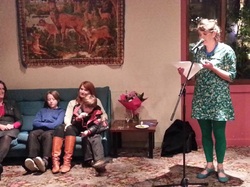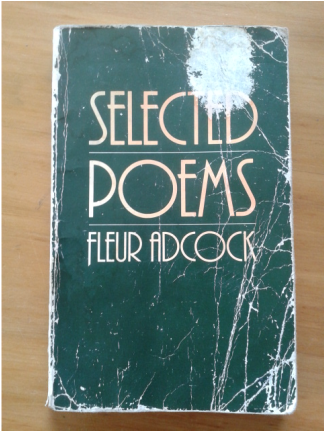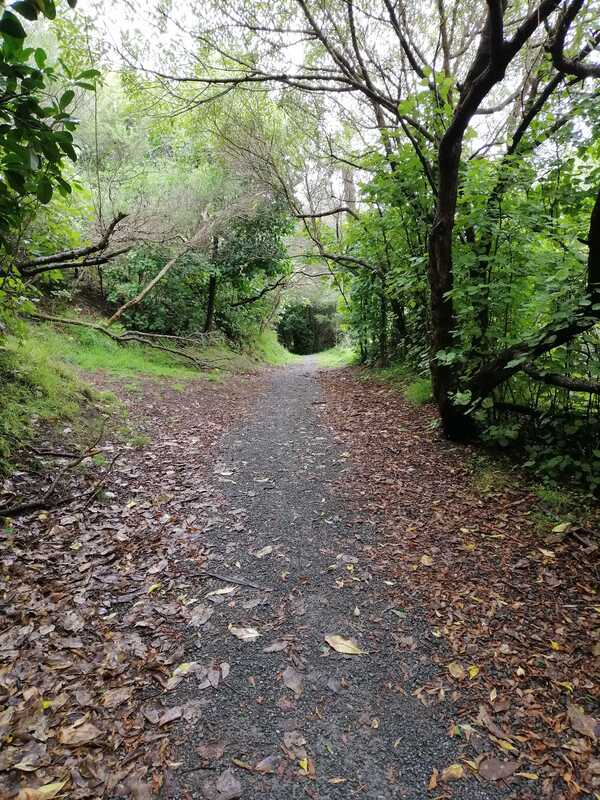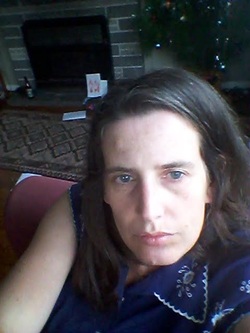|
Selected Poems, Fleur Adcock. Oxford University Press, 1983. Being a girl is dangerous. I don't just mean we are vulnerable to danger, but that we are, ourselves, dangerous, capable of causing great damage to ourselves and others. We, especially in those years we are changing into women, live in danger, where danger is the vibrating state we occupy. I started thinking tonight about Fleur Adcock's Selected Poems which I first read at 15. I remembered the dark green cover and how the spine looked on my parents' bookshelf. The slim sitting room one with the cut out hearts and tidy shelves of Penguins. Have I made up the moment of discovery? Of pulling the book from the shelf, of curling in the large brown chair with the ribbed pattern that would leave its tribal marks on me? The book must have come alive to me then, something that breathed and beat so that next time I came to the shelf I would recognise it. It would hum when I entered the room. It was my mother's book but became mine in the way any book is claimed as intimate property by obsessed readers. I wonder if it in turn claimed me, lodging its shards in my ears and brain and heart, because it was the first book of poetry I really read. A book I read for sheer pleasure but also I read and reread wanting to understand how Fleur Adcock had done it. I don't know if that is peculiarly a budding poet's reading, or if that is the nature of all close reading of poetry. That the thrill of a good poem is watching it run but also holding it in your lap, seeing the bones and muscles move beneath the pelt, smelling its oily springed wool. Understanding how it all fits together. Do teenagers, or at least the kind I was, gravitate towards poetry because the best of it is transformative in the same way adolescence is? Good poetry allowing us not just to see the capacity of the poet, but our own capacities. A transformation from passive childlike recipients of the word and the world, to readers active, engaged and creative in our own right. I think about how it's not just writers who are dangerous, with their strange ability to conjure mountains and moods, but readers too. There is a moment, when we get poems, if we get them, where we are not having something done to us by the poem, but we are doing something to the poem. A good poem, that we have read and understood, can give us a sense of mastery, perhaps what a musician feels when she plays fluently, for the first time, a difficult piece of music. It is a long time since I have opened Adcock's book and when I do it is with great affection as phrases I have loved for 30 years float up off the page out to me, triggering the same pings of pure pleasure as they did on my first encounter with them. ichnueman flies have got in It is 5 a.m. All the worse things come stalking in and stand icily about the bed looking worse and worse and worse ...and tiptoes in sandals that softly waffle-print the dusty floor 'Oblivian, that's all, I never dream' he said – proud of it, another immunity 'Will I die?', you ask. And so I enter on That dutiful exposition of that which you Would rather not know. Phrases which are part of my own history, which have been absorbed into my sense of the musicality of language, and which have shaped how I have read poetry ever since. And now, on this return, an added richness because I see the connection between Adcock and others. Her poems about the death of old lovers feel close to Lauris Edmond's. There is something of Adcock's parental ambiguity in Helen Lehndorf's gothic works of domesticity. I've just read Adcock's sister Marilyn Duckworth's 1970 book Over the Fence is out, and I see shared insight into the complexities of male violence against women. As Helen Heath explores in her poetry the intersections between human and synthetic worlds, I know she should read 'Gas', Adcock's speculative sequence on involuntary cloning. She sees with my imperfect vision, she wears my finger-prints; she is made from me. If she should break the bones I gave her, if disease should invade her replicas of my limbs and organs, which of us is betrayed? On re-examining the book I encounter again Adcock's formidable combination of cool formality and passion. Intense feelings bounded by guarded line and graceful rhythms. Feelings constrained, almost to the point of repression. The words seem to rebel against their dignified imprisonment, amplifying their potency. With Adcock I am always coming and going. Sailing so close to the poems' narrator our skins touch, feeling so close it as is if I understand the warm workings of another's body. This claustrophobia is not always, or even often, pleasant. If I were to touch you I should feel Against my fingers fat, moist worm-skin. I sail from here to a glittering windy world of wry distance, observation, salty intelligence. From Adcock I learned it was possible to write intimately without gushing, to write seriously without being doughy. The arts of deft restraint. This darkness has a quality That poses us in shapes and textures, One plane behind another, Flatness in depth. Your face; a fur of hair, a striped Curtain behind, and to one side cushions; Nothing recedes, all lies extended. I sink upon your image. What surprised me, when I found the battered copy of the never returned book on my shelf in a different room, in a different house, was how dangerous this book is. It's why I started thinking about danger. I wanted to find a belt and wrap it around the book like you must do with Harry Potter's Monster Book of Monsters to avoid being bitten. Selected Poems has tigers and rapists, maggots and prowlers, kitten killing mothers and exile, skinned dogs and nightmarish realisations. It was obscure, but glancing towards the end she guessed that killer, and lover and doctor were the same; proving that things are ultimately what they seem. Every hopeful poem about mothering and childhood in this book contains within it a moment of dying. Every relationship poem contains the demise of the relationship. It's a frightening book. Slightly hellish in its vision, full of serious and very adult truths. It's brutal and beautiful and honest. No wonder I loved it then, love it still. Look, children, the wood is full of tigers, warns Adcock. They've eaten all the squirrels. They want you, And it's no excuse to say you're only children. No one is on your side. What will you do?
0 Comments
 Last night Victoria University Press launched Tree Space my first full-length collection of poetry. It was lovely. Fergus Barrowman of VUP and my official launcher, the fabulous poet Kate Camp both said very nice things. Here's the written version of my thank you speech. First a warning. If you were at the launch of The Rope Walk my first non-full length poetry book last year I am going to thank some of that same people I thanked then so it might get boring. I wrote the poems in Tree Space - my first full length poetry book - over the same time period so everything that applied last time applies this time. Forgive me, check your phones, live tweet, do surreptitious selfies, I understand completely. I am incidentally hoping to continue my series of first poetry books into the future, perhaps in a few years you’ll be invited to the launch of Maria McMillan’s first poetry book with a pink and white cover, and after that the launch of Maria McMillan’s first poetry book dealing with intergalactic time travel and so on. But to Tree Space. Again thank you to my parents for a house full of books and a refusal to accept lazy thinking. To my family and friends who have been supportive and excited about the book. I won’t name you individually but my life and writing are better for you being in it. To my writing group. Apparently Stef Lash, whose book launch I couldn’t be at, has made all thank yous to our writing group for ever awkward by pointing out how bored we must make everyone by going on about how fabulous our writing group is and how much we love each other. I just have to go with it and be awkward and and say that our writing group, Kate, Marty, Stef, Hinemoana and Tusiata is fabulous, and generous and wise and very very lovable. I am ever grateful for them. I feel lucky to get hang out on a regular basis with people so dedicated to the word. You are colleagues in the best sense. Thanks to my partner, father of my children and phycological taxonomist, Joe Buchanan, who I need you to understand is empirically the best person to have a family and share a house and life with. I think as a poet it is very important to not get bored and Joe is never boring. Joe gets curious about things, a bent for mosses, a fascination for the evolution of eyes, enthrallment with 70s kid scifi series, a week of making rockets from household objects, a horde of Donald Duck comics, a stash of soca records. It is Joe of course who introduced me to the notion of Tree space, and numerous other concepts. Joe has peer reviewed some of the lines of the poems in this collection. Yes, that’s alright he’ll say, and then it just gets weird. Joe is also an astonishingly good cook, and as many here can attest it is very important for poets’ craft for us to be well fed. Thank you Joe. I want to thank three poets all called Helen. When one of them was querying what the plural for poets was Joe suggested Helens which seems about right. My dear friend Helen Lehndorf, because she’s true and brilliant and funny and reminds me of the best parts of myself which are the parts I want to write with. Helen Heath, because since we met she’s been a powerhouse of support and merriment. And Helen Rickerby, who is the brains and beauty behind Seraph Press, who published The Rope Walk last year, and whose consideration and contemplation of poetry is a pleasure to be around. If you don’t have any Helens in your life you need them. I’ve deliberately called myself in my bio for this book an activist. In some senses, I feel like dormant activist is a better description, but that didn’t feel like a compelling marketing strategy. Also it was important to me to continue to align myself with the people in the world who are working for change. It would be weird to suddenly re-invent myself as someone to whom injustices that I observe are a side concern. I honour and acknowledge the work I’ve done, and the people, some in this room that I’ve done that work with, it’s shaped me and inevitably my writing. It felt for a long while, that being passionate about social justice and being a writer were not an easy fit in this country. That I was a bit odd, that the writing world that I was looking in on, was a bit too cool for all of that. That being into anything too much was earnest and heavy handed, and that intelligence could only manifest in some sort of fictional neutrality or cultured cynisicm. I probably made all this up and it was grossly unfair. Because what I really want to say now is that my resounding feeling, in this loose Wellington writing community is that I am immersed in the work and thinking of many people who are grappling like me with how to live well and decently in the world, and I am terribly grateful for this. I am learning all the time from the audacity, and strength and humanity of fiction writers like Pip Adam and Kirsten McDougall, Kerry Donovan Brown and Elizabeth Knox to name but a few. Poets like The Helens and my writing group. Many others. I feel in this community in very good company and very welcomed. So I want to thank now the honourable* Fergus Barrowman, for helping bring me out into this community. There’s nothing for a poet quite like the publication of one’s first full-length book of poems. Fergus was enthusiastic from the outset, and agreed with everything I suggested to do with the book which was quite a lot. I found that extremely useful. One of the things we agreed on was the sort of the thing that should be on the cover and who should do it and even though she’s not here to thank, I want to say I could not be happier with Keely O’Shannessy’s design which I think is beautiful and intend to put on my wall. Thanks also to Ashleigh Young and Kirsten McDougall at VUP. With Fergus you have been tremendously tremendous. And your interest and trust and championing of me has been important. No doubt what you said you say to all your authors but thank you, it’s very encouraging. A final thank you to all of you for coming and celebrating. To those who come for VUP and those who came for the wine and those who came to be with me from all different parts of my life, it’s just lovely and thank you. *Fergus recently received a NZ honours for services to publishing, honourable is not strictly his correct title.  So Helen Heath tagged me for the next big thing, where writers self-interview with 10 questions about their next project and then tag five writers to do the same. I'm pretty sure that means every writer in the galaxy will be tagged within 13 months. Here's me.
What is your working title of your book (or story, or project)? The Rope Walk, but it used to be called Sab. My writing group vetoed that and said it sounded like a car advertisement. Sab is actually an old Scottish dialect word for sob, and for the sound of the sea, and has all these gorgeous nuances, but they were right. Where did the idea come from for the book? I had an exercise in a writing class to write two poems in a single week, one an elegy and one a poem that answered the question 'What happened?', 'What Happened Next?'. I had read, sometime earlier, an amazing transcript of the diary of one of my ancestors last days in Scotland, so I spent hours hunting for it in the many boxes of paper around my house, but ended up just doing bits from memory and making up other bits. That felt liberating. That was the 'What happened?' poem, And then I wrote a companion piece which was also fictional, about a woman (married to my 'What happened?' character) and her experience of coming over to New Zealand on one of those early immigrant ships. And then I just kept writing these persona poems in the voice of members of the same fictional family but from different generations. What genre does your book fall under? Um, intergenerational persona poetry sequences that feature aerial performers, 19th century ropemakers and gloomy mountain cribs? Which actors would you choose to play your characters in a movie rendition? As far as I'm concerned Jennifer Lawrence can play everyone. What is the one-sentence synopsis of your book? How do we deal with grief; How do we not deal with grief; How can we be so happy and so sad all at once? (Note the ungrammatical use of semi-colons to hide the fact I wrote three sentences not one). Will your book be self-published or represented by an agency? Seraph Press are publishing The Rope Walk this July. One of the reasons I am really happy about this is Seraph's wonderful Helen Rickerby shares my vision for the book. My partner, a typographer, is going to letterpress the cover. Using that sort of technology feels very right for the collection. How long did it take you to write the first draft of your manuscript? Nine years. Well I wrote the first poem about 10 years ago, and the last one, and I knew it was the last one, about a year ago. It's something that I've put aside, written other stuff, and then gone back and written another of these poems. What other books would you compare this story to within your genre? It dips in and out of centuries and decades, so I have a poem in a fairly contemporary voice, and then an early settler, then one from a teenager living through the 1980s recession and so on. That sort of time-travelling feels like something I learnt more from novels than poetry. Many of my writing classmates and friends have written stuff inspired by ancestry so it feels like a common preoccupation of poets. Tina Retgien has a fabulous unpublished series of poems which draw on her Dutch heritage, Tina and I wrote the first poem in what would become our respective series of poems in the same week in the same class. It was fun watching our collections evolve. I've been excited by the ancestor/family writing of Tusiata Avia, Hinemoana Baker, Marty Smith, Helen Heath, Helen Lehndorf, so many. Who or what inspired you to write this book? I've spent a lot of my adult life as an activist and came, as many left-leaning Pakeha activists do, to a sort of guilty paralysis about issues of colonisation. When I was living in Dunedin I started working with Corso Otepoti, and alongside Freedom Roadworks. These groups had the best analysis I had found of colonisation, privilege and power. Many of the members of these groups had, over a number of different years and groups, become really frustrated with Pakeha stagnancy on racism They came to the conclusion that to move forward, and to engage properly with Maori on issues of injustice in this country Pakeha and other tau iwi had to go through their own process of decolonisation. There was a great emphasis on understanding your own cultural stories of colonisation, I became fascinated with the idea of waves of people from Scotland and England, leaving their countries, their parents, their siblings, the graves of their ancestors and coming somewhere new. And then sometimes awful ship journeys where babies died, and adults too. And then arriving somewhere so utterly different. There must have been so much grief with that. And then I started thinking about how every generation seems to go through some major losses, men being lost in wars, the soul destroying recession of the 1980s, the suicides, the bitter thread through all those years of violence against women. I think grief often isn't dealt with well, and what does that mean, and how does that get passed on down the generations. All that feeds into the book, You might not realise it reading the poems, some of which I hasten to add, are more joyful than sad, but all that stuff is going on there in the background. What else about your book might pique the reader’s interest? In the course of writing this sequence I fell in love with a book, a 1930 reprint of Alexander Warrack's A Scot's Dialect Dictionary . It gave me wonderful (though probably inaccurate) insight. There are about a dozen words for women who sit too close to the fire and don't do their housework, and single words for things like short scurrying men who snuffle or tall stooped men who take long steps. I loved how you could hear twists and echoes of English in there as well. Consonants get transposed, vowels lengthened. Marvellous sounds. I used some of the words in a few of the poems. Warrack didn't distinguish between regional dialects so I have probably got words in the same poem from the voice of a single character, which would have never been heard together in real life. I think that's okay. I think maybe that's good. I tag these people: Hinemoana Baker Kate Camp Marty Smith Pip Adam Sarah Jane Parton |
Categories
All
Archives
March 2023
(C) Copyright 2012, Mrs Loolupants, All Rights Reserved.
|



 RSS Feed
RSS Feed
